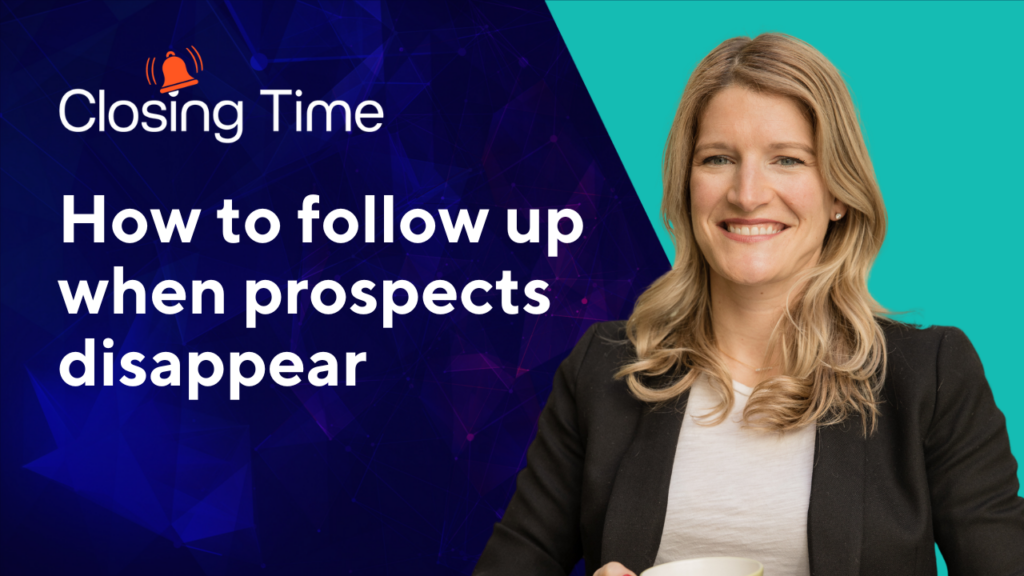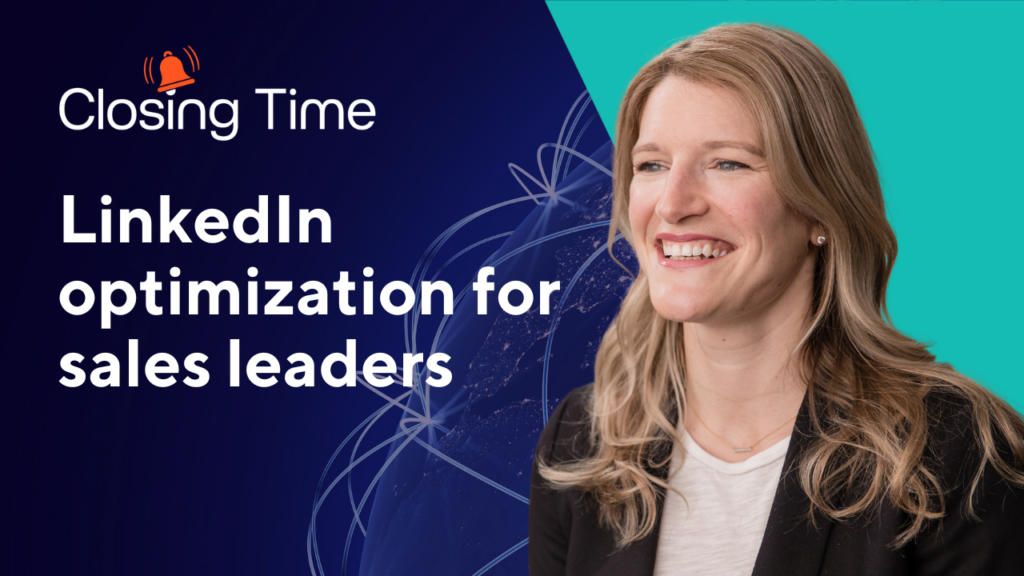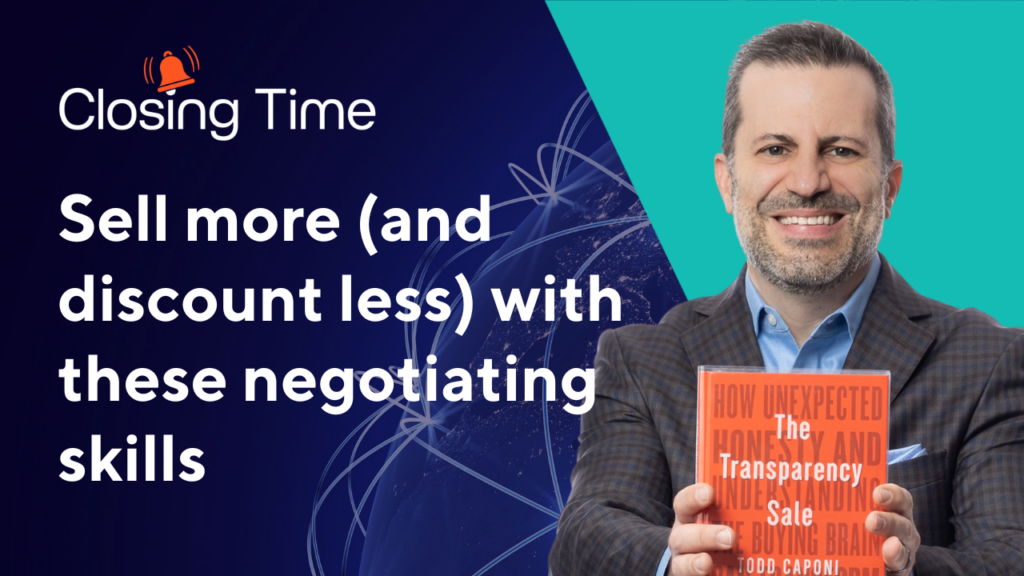Sales leaders know they need to stay ahead of compensation trends. Let’s see what’s new in the market in this episode of Closing Time. Hi, I’m Dave Osborne,. Chief Sales Officer, Insightly. And you’re watching Closing Time the show for go-to-market leaders. Today, I’m joined by Amy Volas, strategic advisor, L-P at Stage 2 Capital and owner of Avenue Talent Partners. She’s also the host of Thursday Night. Sales. Welcome to the show, Amy. I’m excited to be here. We have a lot to talk about, Dave. So it’s a great time for this topic, right? It’s been an insane past couple of years. You know, we’ve gone from the pandemic to the great resignation to now as we enter this recession period, we have lots of companies laying people off, which is really unfortunate. Sales leaders are forced to get more creative than ever with compensation. So, Amy, what are you seeing? What’s driving the market right now? So there are a lot of different things. It’s a complex market because while we’re seeing stories of still high turnover and still low unemployment and then the really sad stories of big layoffs, what does that all mean? It means that when I think about compensation specifically, there are companies that have to do a lot more with a lot less, and they’re going to have to get a lot more creative. And then there are companies that are absolutely thriving. And so I think you have to get real clear about where are you in the market place. If you are a small startup and you burn too hot and you’ve had to lay some people off, that’s a really hard story to tell. It’s also hard to recover from. It’s not impossible. And the only way that you can do that is to be honest. So people don’t expect perfection, but they do expect honesty. So if all of a sudden you’re still seeing the same narrative that you were eight months ago when you got that round of funding and the narrative was, we’re on a rocket ship, we’re the next Uber for blah, blah, blah, blah, blah, and now we need to hire a bunch of people and you got way ahead of yourself. And now you’ve had to course correct that. First and foremost, you need to own that. So talk about what you learned. Talk about if you. I think a lot of people assume that if you lay people off that you are completely done hiring. And what people don’t realize is while you’ve had to lay some people off, you may have to make really strategic hires to get through the storm that you’re going through. And a lot of people don’t realize what it takes to do a business. So, yeah, maybe I had to lay off a portion of my marketing team, a portion of my SDR team and a portion of my customer success team. And now I’m hiring a really heavy duty head of engineering now. Well, if we don’t fix our product problems, nobody’s going to have a job. And that’s why we have to do that. But that head of engineering is going to want to know what’s the deal, you know, like what’s actually going on? Some people really crave a turnaround, but you don’t know unless you find out. So when it comes to compensation, it’s not so easy. Just around dollars and cents. It’s those intrinsic motivators to understand what makes somebody tick. And before you can even do that, it’s stopping for a second and understanding exactly what you’re able to do and what you’re not able to do. And to get comfortable with that. What you don’t want to do is you don’t want to think about this market as, Oh, well, there are some people that are struggling and there are layoffs that are happening. That means that I can get a deal because let me be perfectly clear to anybody that’s hiring here somebody that has mastered their craft, that’s really good at their job, even if they got laid off, they have a crew of other people lined up to hire them, and they will be handsomely rewarded for their efforts. This isn’t about let’s make a deal and it’s a bargain. It’s about paying people fair market value for what they’re doing. And if for some reason you got your rear end handed to you because you’ve had to go through layoffs, and that’s a horrible thing to do, you don’t have the same budget. What can you do outside of money that helps somebody get better? Get real clear on that. Totally agree. I mean, a lot of this has to do with really having discipline right? I think that to some degree or measure with the situation we’re in right now, where we’re seeing a lot of layoffs is due in some part to a lack of discipline. During the great resignation,. I saw offers, you know, kids two years out of college getting 250, 300K offers. It seemed almost irresponsible. Right. But then other people started doing it, so they started doing it and then everyone just got really bloated. Now they’re going to lay off. So I think discipline is a really, really critical part of the process. Right? As market ebbs and flows being consistent to what your threshold looks like and not deviating too much off of that mean because that’s where you can get in trouble. Yeah, I think it’s two fold. It’s on the side of the candidate. And this was happening with sales leadership, this was happening with individual contributors. This was happening across the board where it was like, oh, you know what, the markets in my favor, I’m going to stick it to the man and I’m going to get as much as I can get. And guess what? Now it’s called the great regret. You went for the shiniest of objects. You didn’t master your craft. And for anybody that went for that 10, 20, 30k extra in their base, yes, that’s extra money. And I’m not going to discount extra money, but extra money equals extra responsibility. That equals extra pressure on you to perform and if you’ve not mastered your craft and you don’t know what you’re doing and you left a company that was willing to invest in you, that is a priceless thing, especially you mentioned SDR, right? So I’m just using that as a use case. You’re just starting out if it’s an entry level role and you don’t have a lot of experience let’s say you have a year of experience coming out of school. You don’t know how to work yet, right? You don’t know all of the things about business, about the buyer journey. And if you have a company that maybe didn’t give you that extra 10k, but for it, they gave you priceless amounts of support, of latitude to master your craft and to make mistakes without, if you don’t do your job in the next month, we’re going to put you on a pip and they let you figure it out while they were supporting you all along the way. Oh, and you said, forget you. I’m going to go over to this thing here that’s going to give me $30,000 more in my base when you haven’t earned it. And I know that this is unpopular, but there’s something about earning and mastering your craft and the ability to do that job. Because here’s the thing. The truth is always revealed. If I don’t know what I’m doing and if I’ve done a really good con job in the interview of talking about a lot of things because I saw it on LinkedIn or I’m part of a community and I heard some really cool buzz words and I put those dots together, you’re going to have to do the work. And if you’re unable to do that or you’re unwilling to do that, it’s going to catch up to you and you will no longer have that job. And by the way, a lot of the companies that are laying people off right now, they’re not laying off their very best performers. It’s a complex issue. So as we maybe dig into this, what risks do sales leaders run when it comes to designing and issuing comp plans? Money doesn’t fix what’s broken. That’s the easy button, but it’s not the right button, right? Because regardless of your comp plan, you also need to have a strong hiring process, right? I mean, there’s a lot of other layers that go into making it compelling. Yes. Yes. So let’s start with this. So before we can ever even get into designing of the comp plan, which is the end result of the fruits of my labor, it’s really important to understand the reality of the situation. That’s what I mean by money doesn’t fix what’s broken. So it’s like, well, wait a second, do we have product market fit? So for any early stage founder or early stage sales leader that’s watching this or listening to us, do not spin up a sales team or hire a bunch of people or over hire if you have not validated what it is that you do into the marketplace because you’re setting yourself up and the people that you hire for disaster, nobody’s going to be making any money and the business is just going to be set back in a major way. So like, one, product market fit. Do you have that? Two, do you even know what the territories are? So how many times, Dave, in your life have you seen people say, in enterprise sales we need to hire and there’s so much over hiring enterprise sales like true enterprise sales. That ecosystem is a very small ecosystem and usually you can get away with if you’re just spinning it up, a person on the East Coast, Midwest and West Coast. Amy, I love that. I actually aliken it to when you think about the difference between commercial and enterprise, right? A commercial teams like Army Infantry, right? Huge group of people come in and just knocking everything down versus enterprise sales typically is more like Navy SEALs, really highly trained, tactical, strategic people coming in for specific purposes and really go in deep. Yes. Then think about that, Dave, when it comes to designing a comp plan. So if I treat everybody as one size fits all because I don’t understand the nuances between the work, which is one of the main reasons why it doesn’t work out is I just think it’s a catch all. All the data that I have shows that it takes at least 12 months for a brand new enterprise rep coming through the door to build a repeatable, sustainable, predictable pipeline, at least 12 months. So now if you’ve got a comp plan that incentivizes me to be ramped up within three, we have a big disconnect. And then the reverse, like if you reverse that, right? So if you then try to take a high velocity transactional seller and expect that it’s going to be the same thing as what I just described for enterprise sales, those two things do not correlate. So it’s like your comp plans need to go back to the work that it takes to be successful within that segment. And are you measuring what matters and are the KPIs that you are measuring correlate back to what it takes to be successful that then correlates back to what you’re compensating somebody on? I like to incentivize the behavior that I want to see. And so, for example, an enterprise seller you’re all in sales, sales leaders, enterprise sales, mid-market, commercial, transactional, SDR, I don’t care, channel,. I don’t care, I don’t care who you are. Here’s what the deal is. You’re always going to walk away from something when you take a new job. You just need to make sure that what you’re walking away from is worth it in terms of what you’re going to. Because keep in mind that first year is a build year if you’re in major, major, major enterprise sales, it might be the first 18 months to two years before you start seeing a windfall of commissions. So if I’m trying to design a comp plan for that, then I need to think about this. Hmm. If somebody is walking away from a big pipeline that they just built and they are really making it rain where they came from, and I’ve validated that I need to give them a buffer as they’re ramping up so that they’re seeing some dollars that’s called a draw of some sort. It could be called a sign on bonus. That’s one of the levers that you can pull, right? That’s going to be different than a high velocity, SMB transactional person that’s a one call close. That’s going to get ramped up in a month and a half. It’s a very different thing. So then I would incentivize something different there. But that’s what I mean by that. That makes a ton of sense. Why are companies losing some of these A-players? What’s the draw?. How is this happening? Many, many, many reasons. So one thing is you sold them on the vision and they got super caught up of what it could be. Right? And then they get there and I survey every single person that we talked to and I collect the data. And so this is what the data has shown me over the last seven years of me having my firm. They leave because of leadership. It starts at the top so leadership does not believe in sales. Sales is like a redheaded stepchild that’s like shoved in the corner. It’s an us versus them. And it’s like a deep eyeroll of like unnecessary evil. Well, for anybody that’s listening to this, if you feel that way, let me remind you, if you do not have customers, you do not have a business. And that function drives customers if you mess with their money, right? Like if you tell me you’re going to be able to make $1,000,000 if you do X, Y, and Z, and then I do that. And then the very next quarter you say, yeah, I guess what, now you’re never going to make that again because I’m going to screw with your comp plan. You’re going to irritate A-players and they’re going to leave you because that’s not cool. If I upheld my end of the bargain, you need to uphold yours. Don’t mess with people’s money. You don’t have product market fit. I could be the next coming of the greatest thing since sliced bread of sales. And if you don’t have something that the market responds to and there’s no market fit,. I won’t be able to sell a darn thing. So that’s another reason why people leave. You ignore their ideas you ignore their feedback. They don’t have a voice. You could care less about anything that they have to say. If you just say you’re really good with the numbers, you just do your job and just shut up and go over there. They’re probably not going to stick around for very for very long. I think we’re in the world where people crave flexibility and the mandates that like. So we went from pre-pandemic to where there were some companies that were remote, there were some companies that weren’t remote, and then all of a sudden COVID hits and it’s like and now we’re all remote, whether you like it or not. To now we’re in this world where it’s like, yeah, so we figured it out. And now you absolutely have to go right back to work. Well, if I’m in sales and I’m in enterprise sales and I’m traveling again, why do I have to go back to the office? Right. So I think it’s that concept of meeting people a little bit where they are and understanding what makes them tick. If you are having a revolving door of people and turnover and you’re just badmouthing every single person that left, or you just went through a layoff and I’m quoting the word layoff, it was really a mass firing because you hated the team and you just want to start from scratch. And a lot of companies are doing that right now. And behind the scenes after that, you just bad mouth everybody and their brother. Why am I any different than that? These are a lot of the reasons of why people leave. Wow. A lot to unpack there, Amy. So many different factors playing into this. Really a complex issue so thanks again for the time. Really appreciate you joining us here on Closing Time. Thank you for having me. I feel like we could cover so much more and this just scratched the tip of the iceberg. So for anybody that is listening to us,. I hope this was helpful. And thank you, Dave. This was really a wonderful conversation. I appreciate it. My pleasure.. Thanks, Amy. Let’s do it again soon. Yes, please. Remember, everyone, if you like this video, please subscribe to the channel, and tick the bell for notifications so you don’t miss an episode. We’ll see you next time on Closing Time.






